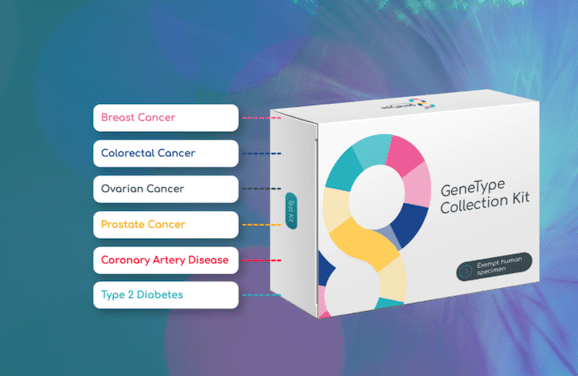What is it and why does it matter?
Traditionally, risk assessment models have focussed on family history and certain clinical factors to determine which populations are at increased risk of disease.1-3 However, the latest research has demonstrated that by incorporating genetic information into these models, the ability to predict a persons risk of developing a disease can be improved.4-6
That’s why geneType™ risk assessments integrate genetic, familial and clinical factors to deliver personalised, predictive testing. This then gives people the information they need to inform their healthcare decisions.
geneType™ risk assessments integrate the following factors to help improve disease prediction:
Clinical factors
This includes information such as your age, blood test results, weight or menopausal status. These factors can tell us how your biology and lifestyle might be influencing your disease risk.
Family history
Most geneType™ tests incorporate information on your family history of disease. In some cases, having a first-degree relative (sibling or parent) with a disease can increase your own risk of developing that same disease.1 Looking at your family history, a doctor, or geneticist may suspect a hereditary cancer link6. This type of link is not in geneType™ risk assessments. The majority of adults do not have a family history suspicious enough to qualify for hereditary testing. This is where geneType™ can be of value. We look at family history risk in all adults, even those with no relatives, or maybe just a single relative with a disease-of-interest.
Polygenic risk
At geneType, we have the expertise and technology to identify disease-associated markers of risk scattered across your genome, known as polygenic risk.6,8-9 These markers are often referred to as SNPs (pronounced ‘snips’), which stands for Single Nucleotide Polymorphisms. They are common. Everyone has them. Depending on the individual combination of these markers, you may have smaller or larger risk of developing certain diseases.
Polygenic risk is not like the hereditary-associated genetic testing in genes you may be familiar with, like BRCA1 and BRCA2.7 Read more about the differences between genetic testing in this article.
A more personalised risk assessment with geneType
By integrating clinical, familial and polygenic risk, geneType™ risk assessments can provide results for a range of different diseases.4,6,8,10-11 For example, geneType™ for Breast Cancer can identify nearly four times as many women at risk of developing breast cancer compared to traditional risk models.10 Similarly, geneType™ for Colorectal Cancer can identify almost twice as many at-risk people than family history alone.6
By providing the most predictive risk assessment possible, geneType™ testing gives people the power to design a personalised health plan with their doctor, including screening and prevention practices tailored to their individual needs.1
References
- Damen, J.A., et al. BMC Med 17, 109 (2019).
- Rockhill B, et al. J Natl Cancer Inst. 2001 Mar 7;93(5):358-66.
- Noble, D. et al BMJ 2011;343:d7163
- Allman R, et al. Breast Cancer Res Treat. 2015 Dec;154(3):583-9.
- Kachuri, L., et al. Nat Commun 11, 6084 (2020).
- Arnold et al. Cardiovasc Drugs Ther. 2021; 35(3): 627–635
- Gafni A et al. PloS One 2021;16:e0251469.
- National Comprehensive Cancer Network. Genetic/Familial High-Risk Assessment: Breast, Ovarian and Pancreatic. Version 1. 2022-August 2021; accessed February 2022
- Dite GS et al. Cancer Epidemiol Biomarkers Prev 2016;25:359–65.
- Wand H et al. Nature 2021;591:211–19.
- Validation of abridged breast cancer risk assessment model for the general population. Poster presentation; SABCS2021.
- Dite, GS. et al. Epidemiol Infect. 2021 Jul 2;149:e162.
Related Articles

It’s not always easy to know what questions to ask your Doctor. Here are some breast cancer risk questions...
Under the fluorescent lights of a doctor’s office, it’s not always easy to know what questions to ask. Here are some breast cancer risk questions...
It’s not always easy to know what questions to ask your Doctor. Here are some breast cancer risk questions...




